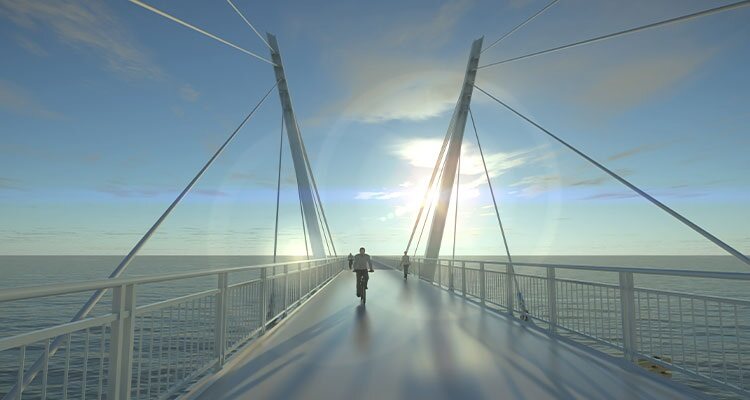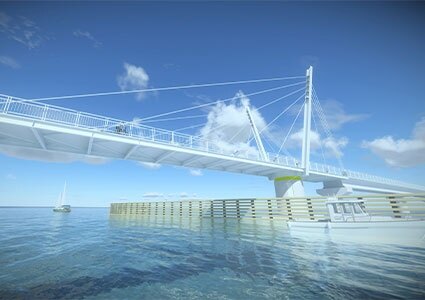
Superior Construction is reinforcing the built environment across the Carolinas as we learn in our conversation with Richard Kirkman, PE
There are many man-made marvels often taken for aesthetic value, rather than the ingenuity required to create them. However, in the case of the Ashley River Crossing pedestrian bridge, both are applicable. Located in Charleston, South Carolina, the bridge will be the first cable-stayed movable pedestrian structure in the country. Its hydraulic swing span components will allow the bridge to open horizontally rather than vertically to improve marine clearance. A key feature of the proposed design is an iconic steel V-shaped pylon, providing a bold architectural statement. Additionally, the outward-leaning stay cable plane will significantly reduce the risk of ice from the cables falling onto the pedestrian path. The business selected to construct this concrete feat is none other than Superior Construction, an American family-owned infrastructure contractor. Once completed, the bicycle and pedestrian bridge will connect West Ashley with downtown Charleston.

The Ashley River Crossing pedestrian bridge was conceived in response to a pressing need for improved transportation options between the two districts. Currently, commuters traveling on US Highway 17 between West Ashley and Downtown Charleston must cross the Ashley River on two parallel bridges with narrow sidewalks. More than 63,000 cars cross these shared-use bridges daily and the high traffic volume resulted in more than 100 bike and pedestrian-related crashes between 2014 and 2019.
Construction Today had the opportunity to sit with Richard Kirkman, Superior Construction’s Division Manager for the Carolinas Region, to find out what it takes to build these impressive structures, and how the industry is managing against economic struggles.
First, the conversation begins with a look at his own career journey, and how he came to be part of Superior Construction’s leadership team. “I was a civil engineering student at the University of North Carolina in 1989. In 1990, I decided, on the encouragement of one of my professors, to enroll in the co-operative education program, which allows students to seek part-time employment with a local engineering or construction firm. This provides students with real-world work experience in their chosen field, while giving the company an opportunity to get to know the student and help guide them on their career path. So, I interviewed for a position at a materials testing company – S&ME – and worked over there for a semester. Unfortunately, the following semester, they ran into financial difficulties, so the students were let go. I was subsequently hired by Blythe Construction as a co-op student, and was assigned to a high-profile water supply dam project in Concord, NC. I worked closely with both the design engineer and construction management staff, producing shop drawings and construction schematics when the engineer suggested a field modification to the original design. I would put his ideas onto paper, then work with the crews to survey and install the modifications. I really enjoyed that work.”
Following this milestone, Richard then went to work for Dane Construction. “The owner of Dane is from Manchester, England. He came to America to work for a different heavy-highway firm in Charlotte before starting his own construction company, specializing in bridge construction. He’s still in business and doing well. I worked for him for close to seven years. I learned a lot from Michael. His success inspired my wife and I to start our own company. My wife is a CPA and managed the accounting and financial side of the business, while I focused on work procurement and project management. We started Kirkman Construction in 2007, but unfortunately suffered due to the 2008 financial crisis. We eventually closed the business in 2011, the year I joined Blythe Development to head up its newly formed Bridge Division.”
After eleven successful years at Blythe Development, the opportunity with Superior Construction came up. “I met with the ownership and executive leadership team, and I was instantly impressed with their level of professionalism and passion for growing the company. I accepted their job offer and joined Superior in January of 2023.” he shares.
Of all the projects Richard has worked on, his most challenging project has been the Concord Mills Flyover Bridge project. Concord Mills is a large a shopping mall located in Concord, North Carolina. “The North Carolina Department of Transportation accepted bids for a bridge project to carry traffic over the highway in front of the mall as a way to improve traffic flow into and out of the mall. While that may not sound very exciting, from a design and construction standpoint, the project was very challenging. That said, we managed to overcome the challenges by working closely with the owner and the design engineer to find solutions to the numerous problems, eventually finishing the project just before the Thanksgiving holiday of 2021,” Richard outlines.
Moving into the broader landscape of the construction industry, Richard sheds light on the three main challenges faced by Superior Construction and the sector at large. The first challenge revolves around complex utility issues, primarily the delays caused by difficulties in relocating existing utilities. The reluctance of utility owners to relocate their assets swiftly creates significant delays and costs for construction projects. In our conversation, Richard emphasizes the need for legislative guidance to address this pervasive problem.
 The second major challenge he highlights is the shortage of qualified labor. A decline in interest in construction careers, both in the field and on the engineering side, poses an obstacle to the industry’s growth. With technology attracting more individuals, the appeal of working outdoors in challenging conditions is diminishing rapidly. Additionally, the industry faces a recruiting quagmire as qualified professionals are actively sought by recruiters, which results in turnover issues.
The second major challenge he highlights is the shortage of qualified labor. A decline in interest in construction careers, both in the field and on the engineering side, poses an obstacle to the industry’s growth. With technology attracting more individuals, the appeal of working outdoors in challenging conditions is diminishing rapidly. Additionally, the industry faces a recruiting quagmire as qualified professionals are actively sought by recruiters, which results in turnover issues.
Furthermore, Richard mentions the rise in construction costs, which significantly impacts project budgets. The construction cost index indicates a recent 20-percent increase, making it more expensive for owners to obtain the same product compared to five years ago. “These issues are some of what we’re focused on as an industry, but we’re having a difficult time motivating change. Construction costs have risen massively, and the Covid-19 pandemic really hurt us in terms of the availability of materials. I think we’re still seeing the impact of that. Fortunately, judging by the last couple of months, I think that will start to sort itself out in the new year,” he shares.
Despite the challenges, Superior Construction remains committed to building the Carolinas Division, with the Ashley River Pedestrian Bridge in Charleston serving as a flagship project. Richard expresses his confidence in the company’s leadership and direction, and emphasizes the importance of adapting to industry changes and fostering a skilled workforce.
In conclusion, Superior Construction’s success in winning the Ashley River Crossing project development not only signifies a pivotal moment for the company, but also mirrors the broader challenges and triumphs within the construction industry. “From my perspective, I’m keen to continue to grow our Carolinas Division. Once that has been achieved, I think we will strengthen our joint venture work, which will solidify our name as a key player in the industry,” says Richard. “As the bridge, and projects of a similar nature, continue to take shape, we will see more of the industry’s resilience, innovation, and determination to overcome obstacles, which will secure a brighter future for infrastructure development across the Carolinas,” he concludes.